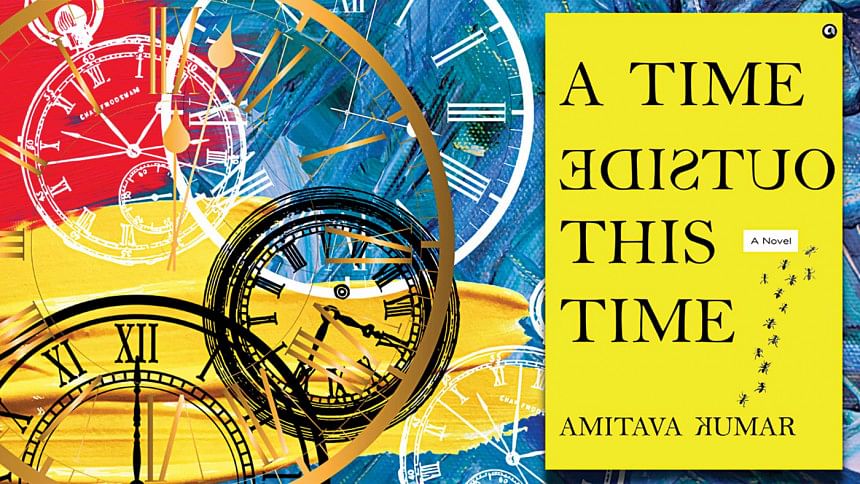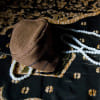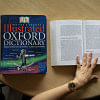Amitava Kumar's 'A Time Outside This Time': An elegant meditation on the lies we tell

At the start of Amitava Kumar's latest novel, A Time Outside This Time (Aleph Book Company, 2021), the main character Satya, an Indian-born US-based journalist, is at a swanky artists' retreat in Italy where he is reading 1984 and writing his own novel, Enemies of the People. Centred on fake news, his novel-under-construction strives to explore the truths and the lies that make up our reality. Facts, Satya tells us, can "lead you in any direction, it just depends on the kind of story you want to tell." In the background, Trump is tweeting away from his porcelain throne while a new virus called Covid-19 begins to engulf the world.
Satya's mission is to weave together a wide range of disparate source material from his own life into a novel. This includes childhood memories, journal entries, tweets, news clippings, scientific facts, his research into the nature of lies, and experiments he learns about from his wife, Vaani, an Indian-born psychologist. Accordingly, we get a nonlinear telling of his upbringing in India and adulthood in America: a touching chapter on communal tensions in the late '70s witnessed as a child in Patna, his coverage of separatist movements and marginalised communities as a journalist hungry for stories, his marriage to Vaani, alongside a litany of facts and research on lies.
A Time Outside This Time could easily double as a college-level introduction course to psychology and a time capsule of news from the pandemic. We find pages dedicated to the infamous Milgram experiment at Yale that studied our obedience to authority figures even when it means inflicting pain on others, the Dunning-Kruger effect (a cognitive bias that leads those with low skills in a task to overestimate their abilities), and the marshmallow experiment studying children's ability to delay gratification, etc., along with the biggest headlines of the past two years. Vaani, who Satya says "lives in a world of experiments," is our primary vehicle into the world of science. Here, too, Satya contends, scientists are merely telling stories, "the same mixture of fiction and facts."
The novel is erudite and elegantly told, but its central charm is its proximity to its subject matter. The pandemic continues to rage on. We have barely woken up from the nightmare that was the Trump presidency and the question of what is true (and what is not) remains unresolved in our culture. To have a fictional character navigate Covid-19 and the alternative facts debated so bluntly on the page while we are living through it ourselves is thrilling, disconcerting, and reason enough to pick up this novel. And while other pandemic novels have been written these past two years by Western writers, Kumar's critical lens on the global South Asian experience is necessary and resonates easily with a Bangladeshi reader.
In an early chapter, Satya meets Farooq, a Pakistani immigrant detained post-9/11 and forced by the FBI to translate recordings of men being tortured. Satya's writerly inclination is to side with Farooq as a victim of Islamophobia, but this is complicated when Farooq turns out to be less than truthful himself. Another section takes Satya into the Indian hinterlands to investigate the encounter killing near Kolkata of a young rebel leader, Avinash, a stand-in for the insurgencies that dot contemporary South Asia. Here the facts of systemic state oppression fade into the fiction of nationalism. We see the alarming devolution of the Indian press in recent decades, represented humorously through a conniving television host with a reputation for yelling at his guests. We ponder what these developments along with our tendency to look away means for democracy and the future of the truth in our context.
As the story unfolds, a creeping suspicion of Satya's own reliability as a narrator may take root. Why is this man so enamoured by lies? His obsession feels personal, hinting at something waiting to emerge from the emotional backwaters, or, perhaps, a sinister intention. This turns out to be more cynicism on the reader's part, a bit of our past conditioning, than the novel's doing. Despite Satya's opening premise that "in our world, we are surrounded by lies", A Time Outside This Time doesn't betray any malintent from its main character. Satya is an earnest narrator writing a novel about lies while the world around him falls apart.
Amidst the uncertainties of Covid-19, this may even come as a relief to some as it did for this emotionally exhausted reader. It may also make A Time Outside This Time an ultimately unsatisfying read for others.
Shoaib Alam is a writer and chief of staff at Teach For Bangladesh.

 For all latest news, follow The Daily Star's Google News channel.
For all latest news, follow The Daily Star's Google News channel. 








Comments